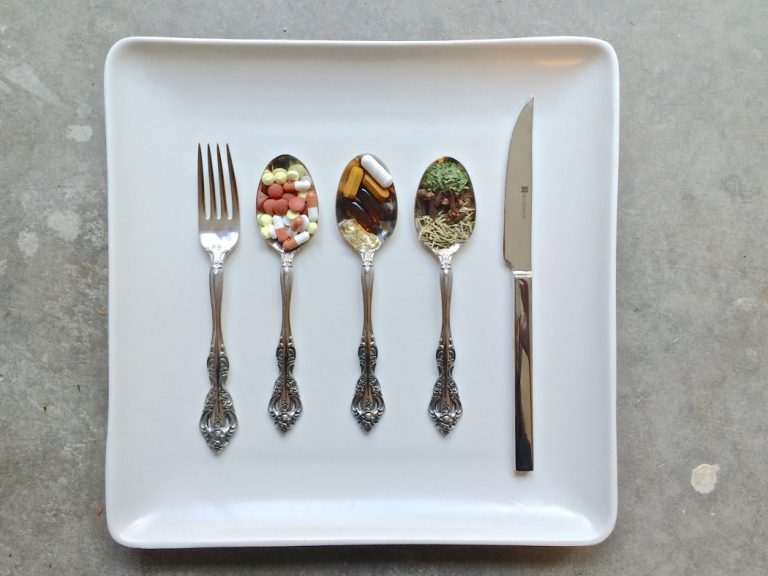Salt isn’t bad for you. Excess consumption of processed salt, however, is bad for you. Avoiding salt like the plague is also not the best idea. I learned this the hard way a few years ago.
During the beginning of my doctoral program, I started to have insomnia, anxiety, and unstable energy levels (tired, yet wired). I would be completely exhausted, but would also feel very restless and was unable to sleep. I could literally feel the adrenaline rushing out above my kidneys, felt panicky and irritable, and my hormones had all gone haywire.
In an effort to counteract the stress and maintain a healthy weight, I decided to experiment with altering my food and nutrient intake. I had learned that bodybuilders and athletes often manipulated their water weight by cutting out sodium and increasing potassium. It works. I was living off of bananas and grilled chicken, and was drinking distilled water sparingly. For a few months, I was in amazing shape. I was also relying on caffeine to keep me awake, and ambien to help me sleep. I had successfully manipulated my body to be lean. I was energetic when I needed to be productive, and relaxed when I needed to sleep. I had also successfully thrown my entire physiology out of balance, and created a vicious cycle that took years to recover from. Hello, adrenal fatigue.
Stress, thyroid hormones, aldosterone, cortisol, water, sodium, and other hormones and neurotransmitters all work together in a delicate balance. When you cut too much salt out of your diet, your thirst mechanism isn’t triggered as easily, which means you probably won’t feel inclined to drink enough water. Chronic dehydration causes cortisol levels to increase, because the body is literally fighting for its life. Once this cycle picks up speed, it starts to affect the thyroid and adrenal glands, which are responsible for controlling the release of hormones that are essential for reproductive health, metabolism, brain function, and basically everything else involved in staying alive and healthy. When adrenal fatigue gets more serious, aldosterone levels become depleted, and our bodies don’t get enough water, or use it efficiently, and one symptom is that ongoing feeling of being on a rollercoaster-a never ending adrenaline rush.
When the body is under stress, especially for people who have hypothyroidism, a balanced diet is essential. Part of that balanced diet includes a healthy sodium and potassium balance. Consuming more sources of natural sodium that is rich in iodine and avoiding foods with potassium (bananas, potatoes, etc), and caffeine (or any other diuretics) is a critical part of healing the adrenals from the effects of stress or chronic dehydration.
Here are some salt facts that will help you make informed decisions
Not all salt is created equally
Table Salt vs. Mineral and Sea Salt:
Table salt has become controversial not only for being excessively added to processed or fast foods, but for containing chemical additives. Current regulations allow for additives to make up to 2% of salt content. Ferrocyanide, talc, and silica aluminate are commonly added to salt as anti-clumping and preservative agents, and can be toxic to the brain and immune system if ingested in excess. Most table salt is heat processed at 1200 degrees, which depletes its natural health-boosting trace minerals.
Himalayan pink salt is harvested from salt mines in the Himalayan Mountains, and gets its pink hue from trace amounts of iron oxide. Himalayan salt is considered to be the purest form of salt because the evaporated sea water crystals have been preserved and protected from pollution by volcanic lava for hundreds of thousands of years. Himalayan salt contains over 80 trace minerals that are beneficial for the body.
Selenium-acts as a chelating agent and flushes heavy metals out of the body.
Chromium-helps to maintain healthy blood sugar levels.
Copper-helps new arteries to form when existing arteries become clogged.
Iron and zinc-boost metabolism and energy.
Salt is a Natural Antibiotic:
Consuming healthy amounts of natural mineral or sea salts is beneficial in fighting off bacteria and parasites. However, excess salt intake kills the healthy bacteria that live in the digestive system. As a result, yeast overgrowth (also known as candida) can cause symptoms such as migraines, muscle aches, fatigue, irritability, asthma, and insomnia.
Iodized Salt:
Iodine is essential for healthy thyroid functioning. Many people make the mistake of cutting out salt all together, and as a result, do not consume enough iodine. One of the easiest ways to get a sufficient intake of iodine is by consuming mineral salts, which are rich in natural iodine. Table salt contains synthetic iodine, and should be avoided when possible. If your doctor has advised you to maintain a low sodium diet, be sure to consume other foods that contain iodine, such as eggs, cranberries, or plain yogurt.




